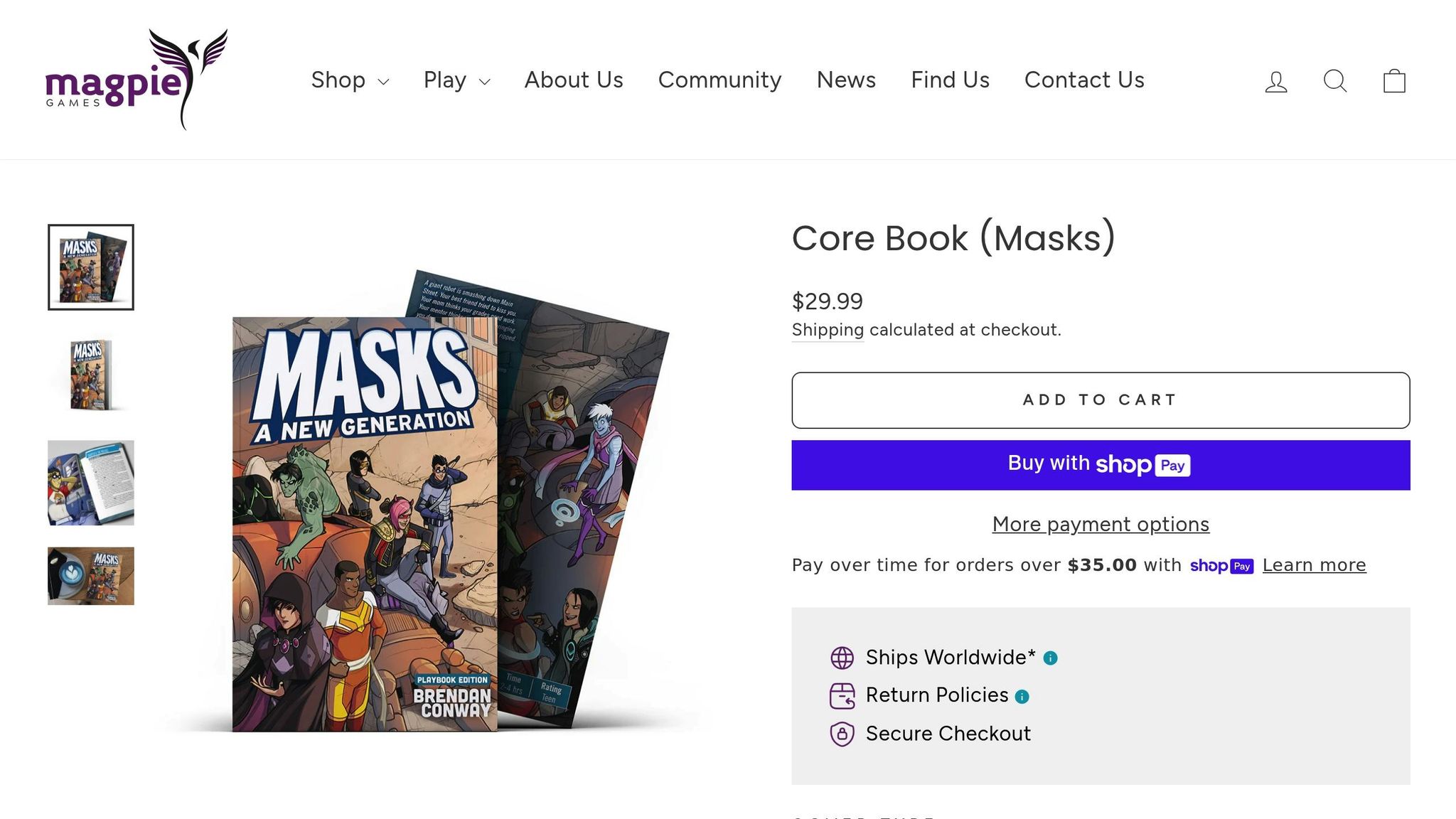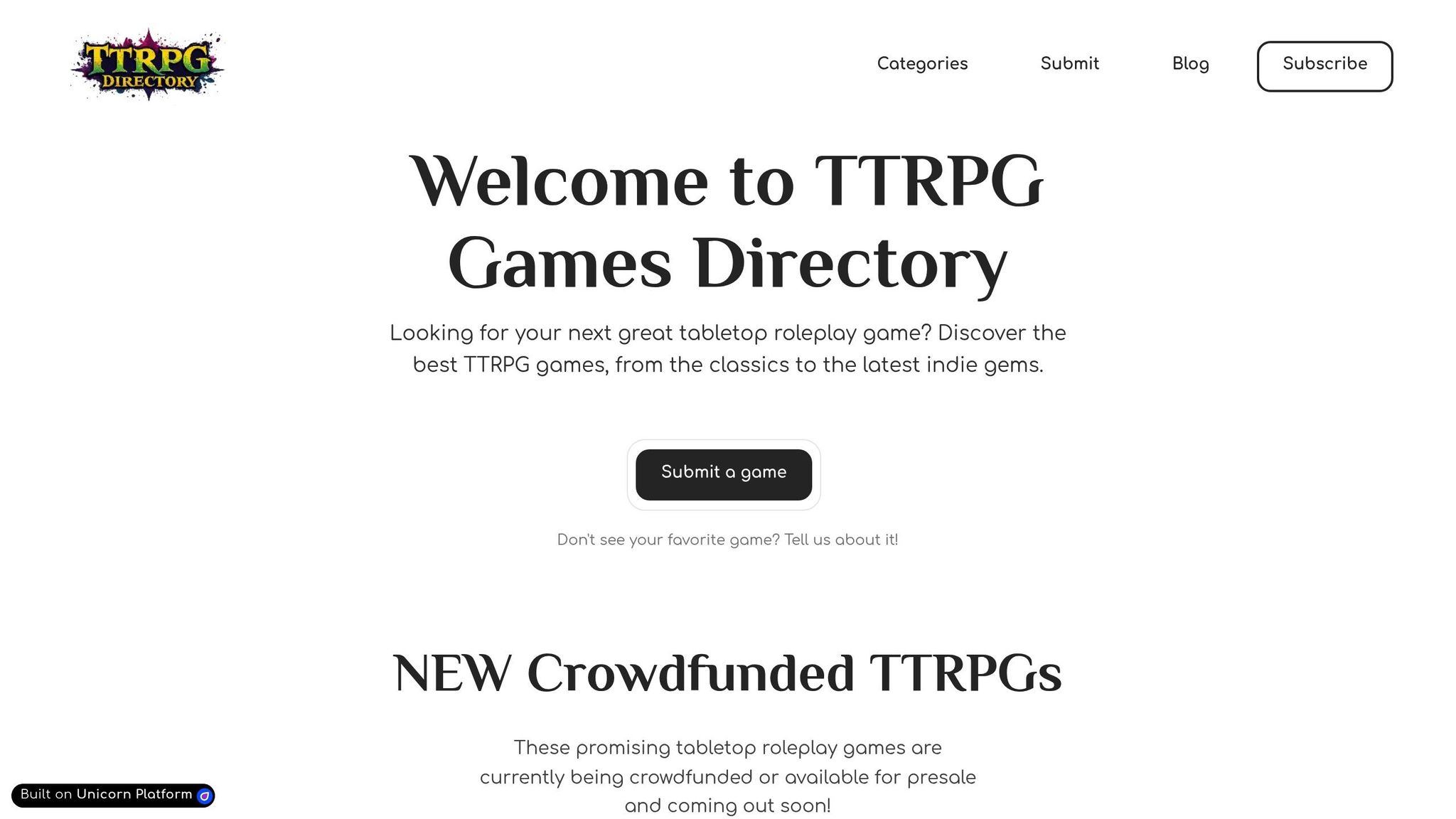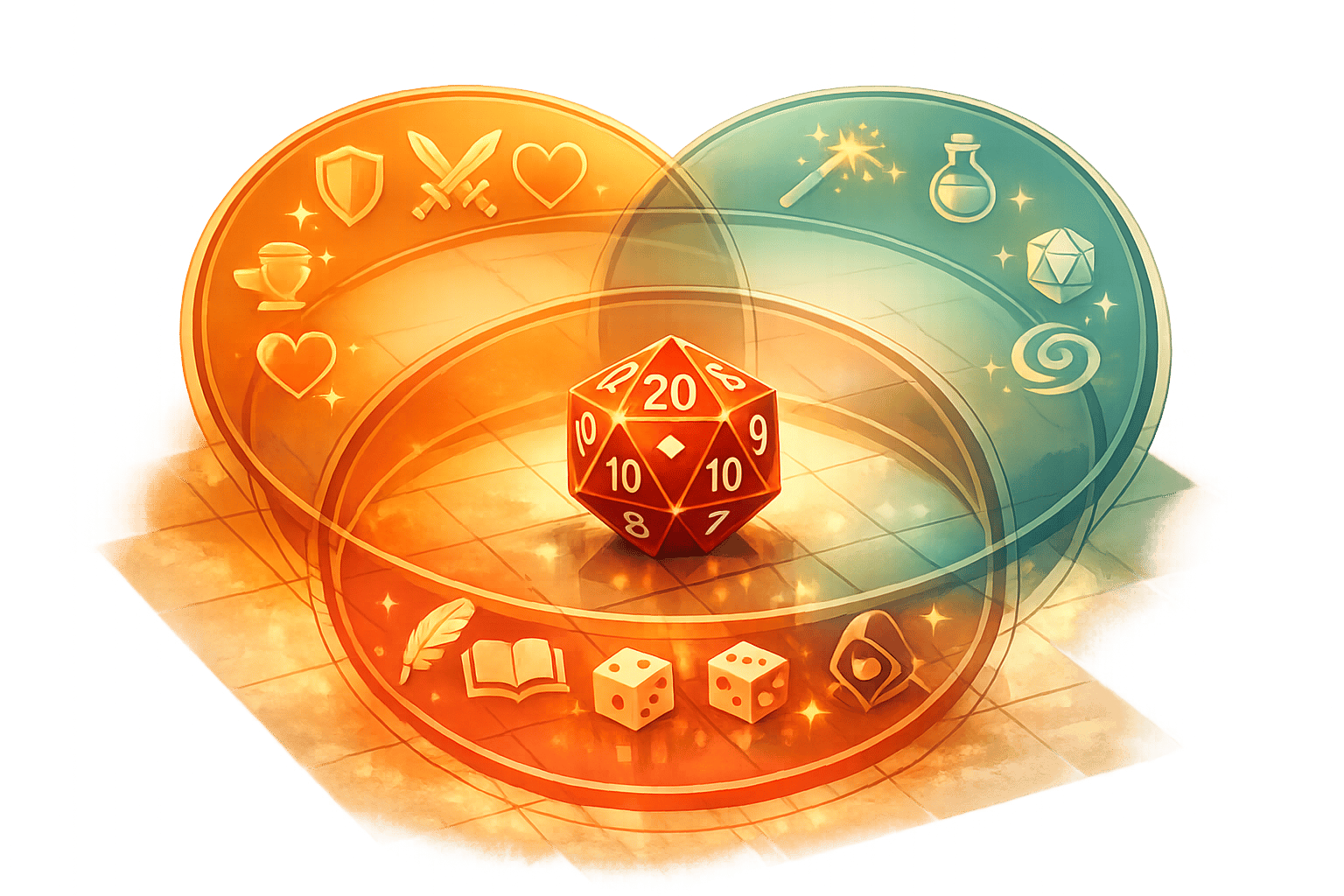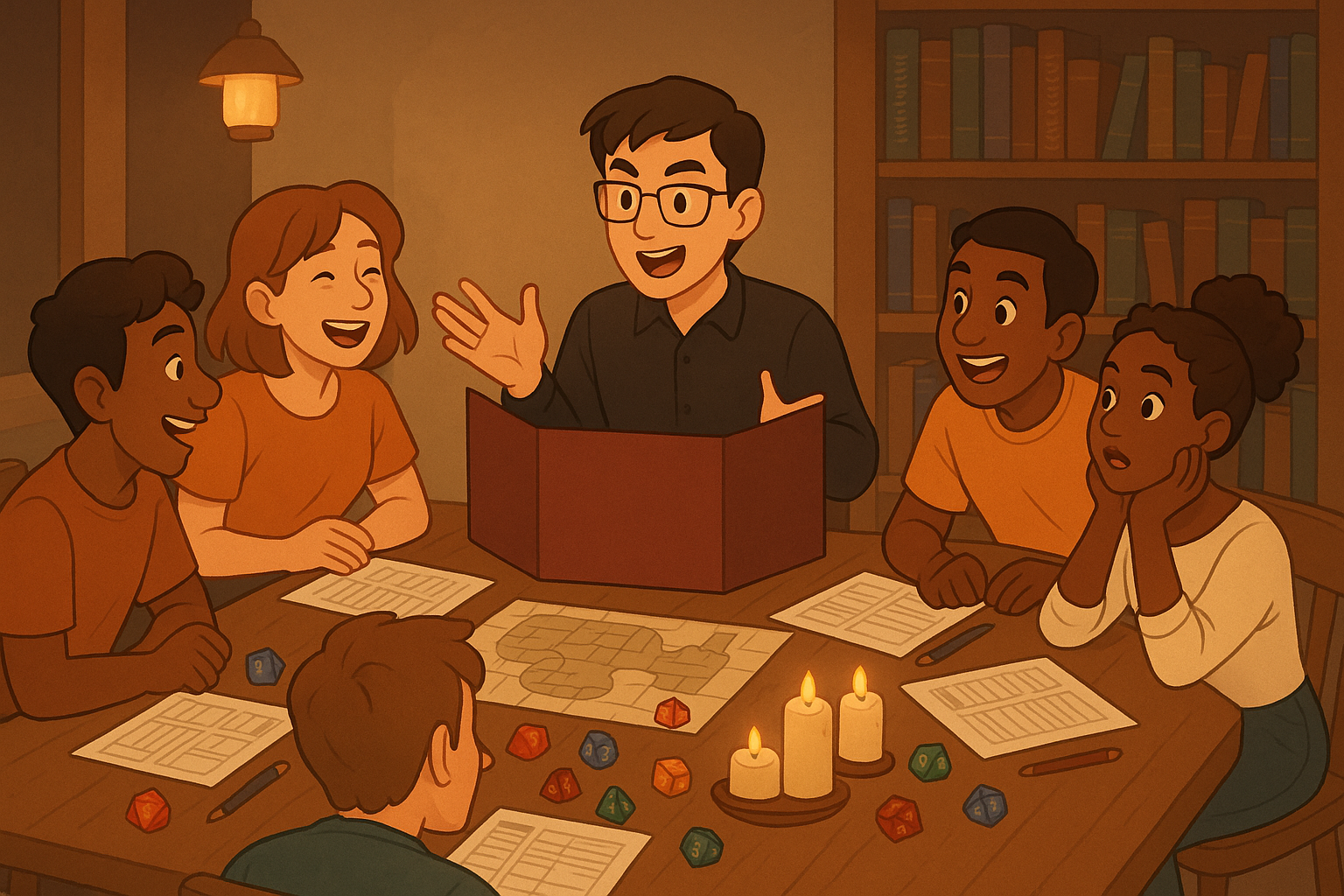PBTA games, short for Powered by the Apocalypse, are tabletop role-playing games designed to prioritize storytelling over rules. They use a simple 2d6 dice system and focus on collaborative narrative-building, making them beginner-friendly. Popular PBTA games include Monster of the Week (supernatural mysteries) and Masks: A New Generation (teenage superheroes). Here's why PBTA is a great starting point:
- Simple mechanics: Roll 2d6, add a stat, and interpret results (success, partial success, or complications).
- Story-driven gameplay: Actions are based on the story, not rigid rules.
- Pre-made character templates (playbooks): Easy-to-use archetypes streamline character creation.
- Collaborative approach: Players and Game Masters (GMs) shape the story together.
- Beginner-friendly tools: Quick-start guides and minimal preparation.
Quick Overview of Two Beginner PBTA Games:
- Monster of the Week: Episodic supernatural investigations with clear goals.
- Masks: A New Generation: Focuses on superhero action and personal growth.
PBTA games are ideal for groups seeking creative, dynamic, and accessible RPG experiences. Whether you want to hunt monsters or navigate teenage drama, these games offer engaging stories with minimal complexity.
Core Mechanics and How PBTA Games Work
Rolling the Dice: 2d6 Mechanics
At the heart of PBTA games lies a straightforward and effective dice system. Here's how it works: roll 2d6, add an attribute modifier, and interpret the result.
- A roll of 10 or higher means a full success.
- A roll of 7–9 indicates a partial success, often with complications.
- A roll of 6 or lower introduces narrative challenges.
This simple structure keeps gameplay engaging. Characters feel capable, but the ever-present risk of complications ensures the story remains dynamic and unpredictable.
Moves and Player Agency
PBTA games revolve around moves, which are triggered by specific narrative actions. Each move has a clear fictional trigger tied to the unfolding story. For instance, in Monster of the Week, the move "Act Under Pressure" kicks in when your character faces immediate danger or a high-stakes situation.
What sets PBTA apart is how it empowers players to drive the story. You describe your character's actions, and the fiction determines which move applies. Instead of asking, "Can I use my Investigation skill?", you might say, "I rummage through the victim's apartment, looking for anything that might explain what happened." This narrative-first approach keeps the focus on storytelling, making every action feel authentic and connected to your character's personality and goals.
By tying moves directly to the story, PBTA avoids the common RPG pitfall where players feel detached from their characters. Every roll is rooted in the shared narrative, making the outcomes more meaningful and immersive.
Role of the Game Master (GM)
In PBTA games, the GM's role is less about control and more about collaboration. Rather than acting as an adversary or meticulously planning encounters, the GM's primary job is to facilitate the story. They follow a set of principles and moves designed to keep the narrative flowing and ensure the spotlight stays on the player characters.
Unlike traditional RPGs, PBTA GMs don't rely on pre-scripted outcomes or rigid plans. Instead, they respond to player actions and dice rolls by asking questions, building on established fiction, and introducing twists that arise naturally from the story. For example, when a player rolls a 6 or lower, the GM uses a hard or soft move:
- Soft moves hint at future trouble or raise questions to build suspense.
- Hard moves deliver immediate consequences or escalate the stakes.
This structure gives GMs a clear framework, making it easier for newcomers to step into the role without feeling overwhelmed. It also ensures that the game remains fluid and story-driven.
Another key responsibility of the GM is to bring non-player characters (NPCs) to life. NPCs aren't just obstacles or quest-givers - they're fully realized individuals with their own motivations, relationships, and agendas. The GM gives them distinct voices and personalities, ensuring they feel like genuine parts of the world rather than just tools for the plot.
This collaborative storytelling approach creates a shared creative space where everyone at the table contributes to the unfolding narrative. For new GMs, this style can feel less intimidating than traditional RPGs. Instead of needing all the answers, they're encouraged to ask compelling questions and build on the players' ideas, making the experience rewarding for everyone involved.
How to Play PbtA (Powered by the Apocalypse)
Best PBTA Games for Beginners
If you're new to the world of Powered by the Apocalypse (PBTA) games, there are plenty of great options to dive into. Two standout choices for beginners are Monster of the Week and Masks: A New Generation. These games are approachable, fun, and offer unique experiences that highlight the strengths of PBTA's storytelling style. Each brings something different to the table, making them excellent starting points for new players and GMs alike.
Monster of the Week

Monster of the Week captures the vibe of supernatural TV shows where hunters face off against mysterious creatures threatening the everyday world. It's a perfect pick for anyone who loves episodic adventures, as the game's structure mirrors the pacing of a TV series.
The premise is straightforward: track down the monster and stop it. This clear goal gives players and GMs a strong foundation for building stories. The mystery format naturally creates tension, with investigation scenes leading to a dramatic showdown.
Characters are built using playbooks, which represent archetypes like the Chosen (a hero with a destiny), the Expert (a seasoned monster hunter), or the Mundane (an ordinary person caught in extraordinary circumstances). Each playbook comes with unique moves and equipment, making it easy to dive into your role.
One of the game's strengths is how it teaches PBTA basics through its mystery structure. The GM provides clues, players investigate using their moves, and the story unfolds based on their choices and dice rolls. This setup helps new GMs learn to respond to player actions while keeping the narrative on track.
Monster of the Week also includes tools like the mystery countdown, which outlines what happens if the hunters don't act in time. This adds tension and urgency without requiring the GM to spend hours prepping.
Masks: A New Generation

Masks: A New Generation shifts the focus to teenage superheroes juggling world-saving missions and personal struggles. Inspired by shows like Teen Titans and Young Justice, it leans heavily into storytelling about identity and relationships.
Instead of traditional stats, Masks uses Labels like Danger, Freak, Savior, Superior, and Mundane. These Labels reflect how characters see themselves and how others view them. They shift during gameplay based on your actions and interactions, creating a dynamic system for character growth.
Masks excels at emotional storytelling. Players spend as much time navigating teenage drama and mentor relationships as they do battling villains. This focus on character interaction makes it a great choice for those who might find combat-heavy games intimidating.
The game also encourages collaborative world-building. From the start, players help shape the superhero setting, define relationships, and set the tone for their story. This shared process fosters investment and creativity.
Like Monster of the Week, Masks uses playbooks to define characters. Each playbook represents a specific superhero archetype and teenage experience. For example, the Bull is a powerhouse who solves problems with brute force, while the Delinquent thrives on rebellion. The Nova, on the other hand, struggles with controlling immense powers. These archetypes come with built-in story hooks, making it easy to jump into the action.
Comparison Table of Monster of the Week and Masks
| Feature | Monster of the Week | Masks: A New Generation |
|---|---|---|
| Theme | Modern supernatural horror/investigation | Teenage superheroes and coming-of-age |
| Session Structure | Episodic mysteries with clear objectives | Ongoing character development with superhero action |
| Learning Curve | Easy - familiar TV-style mysteries | Easy - focuses on emotions over rules |
| Character Focus | Professional teamwork and competence | Personal growth and relationships |
| GM Preparation | Moderate - requires planning mysteries | Light - emphasizes improvisation |
| Best For | Fans of investigation and horror | Fans of character drama and relationships |
| Duration | 3-4 hours per mystery | 2-3 hours with ongoing storylines |
| Age Rating | Teen+ (horror themes) | All ages (positive superhero themes) |
Both games are fantastic introductions to PBTA, but they cater to different tastes. If you love unraveling mysteries and battling supernatural threats, Monster of the Week has you covered. If you're more interested in exploring character relationships and emotional storytelling, Masks: A New Generation is the way to go. Either way, you'll get a rich, story-driven experience that highlights the best of PBTA mechanics.
sbb-itb-b8b00a5
Tips for Starting Your PBTA Journey
Diving into PBTA games can be simple and enjoyable with the right mindset. Whether you're brand new to tabletop RPGs or just exploring the PBTA style for the first time, these tips will help you feel prepared and excited to get started.
Choosing the Right Game and Playbook
The first step is picking a PBTA game that matches your group’s vibe. If you’re into solving mysteries with a touch of supernatural flair, Monster of the Week offers a structure that feels like stepping into a TV show. On the other hand, if your group leans toward exploring relationships and emotional depth, Masks: A New Generation blends superhero action with heartfelt character drama.
Once you’ve chosen your game, take some time to explore the playbooks - these are essentially character templates that shape your role in the story. For example, in Monster of the Week, the Expert is ideal for players who want to be the team’s go-to for monster lore and investigation leads, while the Mundane brings a unique charm as an ordinary person navigating extraordinary situations. In Masks, think about how the game’s Labels (like Danger or Savior) align with your character’s personality. The Protector, for instance, focuses on shielding teammates, while the Outsider wrestles with being different from both heroes and civilians.
Before your first session, review your playbook’s moves. Knowing what your character can do will help you feel confident and ready to dive into the action. Most playbooks offer 2-3 key moves to start, with more advanced options unlocking as you progress.
Once you’ve picked your game and playbook, it’s time to prepare for your first session and get everyone on the same page.
Setting Up Your First Session
PBTA games thrive with 3-5 players plus a GM. Fewer players can make the story feel a bit sparse, while larger groups might struggle to give everyone a chance to shine. Plan for about 3-4 hours for your first session, which should include time for character creation and a complete story arc.
What you’ll need is pretty straightforward: two six-sided dice per player, character sheets, and pencils. Unlike some RPGs, PBTA games focus on conversation and storytelling, so you can skip the battle maps and miniatures.
Character creation is best done as a group activity. Dedicate 45-60 minutes at the start of your session to build characters together. This process helps establish relationships between characters and gets everyone invested in the story. In Masks, for instance, players decide how their characters know each other and what tensions might exist. In Monster of the Week, characters often share a history of dealing with supernatural threats or professional collaborations.
For your first session, start with a simple scenario. GMs should avoid overly complicated plots or intricate mysteries until everyone feels comfortable with the mechanics. A straightforward monster hunt or a single villain causing trouble gives you the space to focus on learning the system while still telling an engaging story.
With your session set up, the real fun begins - bringing the story to life through improvisation and collaboration.
Focus on Storytelling and Improvisation
PBTA games shine when storytelling takes center stage. Don’t stress about mastering every rule right away - these systems prioritize narrative flow over rigid mechanics. If something isn’t clear, make a quick decision and revisit the rule later.
Lean into the "fiction first" approach. Instead of saying, "I want to use my Investigate move", describe what your character is doing: "I search the victim's apartment for clues about what killed them." The GM will then guide you on which move applies. This keeps the focus on the story rather than the mechanics.
Collaboration is key. Incorporate others' ideas into your actions to create a richer, more dynamic story. For example, if another player mentions strange symbols at a crime scene, your Expert might connect them to a previous case. This back-and-forth builds a world that feels alive and unpredictable.
Even when it’s not your turn, ask questions and make suggestions. PBTA games encourage group participation, and GMs often invite players to help shape the world: "What does the abandoned warehouse look like?" or "How do you think the villain escaped?" These moments let everyone contribute to the story.
Finally, stay flexible. PBTA games thrive on improvisation, so let the story surprise you. Your character’s goals and motivations might shift based on dice rolls or interactions with other players. Instead of sticking to a rigid plan, respond authentically to the situations that unfold.
Resources and Tools for New Players
Getting started with PBTA games can feel like a big leap, but the right resources and tools can make your first adventure a lot more manageable - and a lot more fun. With some preparation, you’ll feel ready to dive into these storytelling-focused games with confidence.
Using the TTRPG Games Directory

The TTRPG Games Directory is a fantastic starting point for exploring PBTA games. It allows you to browse titles under the "Powered by the Apocalypse (PBTA)" category, helping you find a game that matches your group’s interests. The directory also includes a "What do players think?" section, where real user reviews shed light on the highlights and potential challenges of each game. For instance, if you’re thinking about trying Monster of the Week, the directory suggests pairing the main rulebook with supplementary resources to address common hurdles faced by new players.
One of the most useful features is the comparison tool, which breaks down how different PBTA games stack up against each other. For example, it can help you see how the episodic mystery structure of Monster of the Week differs from the character-driven storytelling in Masks: A New Generation, even though both share the same core mechanics. The directory also connects you to resources like official rulebooks, quick-start guides, and other helpful materials. Plus, you can subscribe to a weekly newsletter to stay updated on new PBTA additions. These tools make it easier to go from researching games to actually playing them, smoothing the learning curve for beginners.
Other Helpful Resources
Free quick-start guides - like those available for Monster of the Week and Masks: A New Generation - are a great way to dip your toes into PBTA games. These PDFs often include simplified rules and pre-generated characters, making it easy to try out a game without committing to the full rulebook right away.
When you’re ready to dive deeper, official rulebooks provide detailed instructions and guidance for more immersive gameplay. Online communities, such as Reddit forums or Discord servers, are another excellent resource. Here, you can find advice, troubleshoot problems, and even join discussions about actual play experiences. Speaking of actual play, podcasts and videos can be incredibly helpful for understanding the flow and collaborative nature of PBTA games. Watching experienced players in action can give you a better sense of how to bring the narrative to life.
US-Specific Considerations
If you’re in the United States, there are some local perks and tips to keep in mind. Digital copies of PBTA games are widely available at reasonable prices, while physical copies can often be found through major retailers like Amazon, Barnes & Noble, or your favorite local game store. Be sure to check shipping times if you’re ordering online, as they can vary.
PBTA rulebooks and character sheets often follow U.S. conventions - like MM/DD/YYYY for dates, Fahrenheit for temperature, and customary units such as feet and miles. Local game stores are also a great resource. Many stock popular PBTA titles and may host regular tabletop RPG nights, giving you a chance to try demo copies or meet other players. Additionally, events like Gen Con, PAX, and smaller local conventions often feature PBTA game demos and tournaments. These events are a fantastic way to experience PBTA gameplay firsthand and connect with the broader tabletop gaming community.
Starting Your PBTA Adventure
Key Takeaways
PBTA games bring a fresh approach to tabletop RPGs by focusing on storytelling and accessibility. The simple 2d6 system eliminates the need for complicated math or constant rule-checking, letting you dive straight into what matters most - crafting unforgettable stories with your friends. Every roll, whether it’s a success or a failure, pushes the story forward in exciting ways.
What sets PBTA games apart is their player-driven design. Instead of following a predetermined script, you and your group actively create the world and shape the narrative through moves and playbooks. This collaborative style ensures no two sessions feel the same, keeping the experience fresh and unpredictable.
Failures in PBTA aren’t setbacks - they’re opportunities. A roll that doesn’t go as planned doesn’t stop the story; it adds drama, tension, and unexpected twists. These moments often become the highlights of your campaign, turning what could have been obstacles into the most exciting parts of the adventure.
Take the First Step
Starting your PBTA journey is easier than you might think. Begin by choosing a game that excites you and gathering a group of friends ready to dive into storytelling. For your first experience, consider trying a quick-start or one-shot session before committing to a full campaign. For example, Monster of the Week is perfect for a single evening of supernatural sleuthing, while Masks brings all the drama of teenage superheroes to life in just a few hours.
If you’re unsure where to start, check out the TTRPG Games Directory. It’s packed with player reviews and comparison tools to help you find the perfect game for your group’s interests and experience level. Don’t stress about memorizing every rule before you begin - PBTA games are designed to be learned as you play.
The real magic of PBTA lies in its collaborative spirit. Players contribute ideas to build the world and shape the story, while GMs ask questions and weave those ideas into the narrative. Everyone at the table has a hand in creating the adventure, and there’s no “wrong” way to play as long as the group is having fun and the story keeps moving.
Your first session might feel different from other RPGs, and that’s the beauty of it. PBTA games thrive on creativity, encourage bold choices, and turn unexpected moments into the foundation for incredible stories. So grab your dice, gather your friends, and let the adventure begin. Who knows where the story will take you?
FAQs
What are some tips for first-time Game Masters running a PBTA game?
If you're stepping into the role of Game Master (GM) for a Powered by the Apocalypse (PBTA) game for the first time, start by focusing on the basics: Fronts, Threats, and Arcs. These elements are the backbone of PBTA games and will help you guide the story without the need for a rigid, pre-planned plot. PBTA games shine when the storytelling is collaborative, so leave plenty of space for your players to influence the narrative.
To make things easier, consider using pre-generated characters or running a one-shot adventure. This approach cuts down on prep time and allows you to dive into the action more quickly. It’s also a great way to get a feel for the game’s flow. Take some time to familiarize yourself with the core moves and themes of the game, as these are central to how the story unfolds during play.
Lastly, keep your group small and welcoming. A smaller group fosters a more supportive atmosphere, making it easier for everyone to feel comfortable diving into the story together.
These steps will help you ease into the role, embrace the game's open-ended nature, and let the creativity flow as you run your first PBTA game.
What makes PBTA games unique in character development and storytelling compared to traditional RPGs?
PBTA games are known for their emphasis on collaborative storytelling and character-focused narratives. Rather than sticking to rigid plots or complex mechanics, these games rely on adaptable prompts and player-driven actions to guide the unfolding story. This style encourages improvisation, allowing characters to grow organically through their choices and interactions.
In contrast to more traditional RPGs, where character progression often hinges on leveling systems or fixed story arcs, PBTA weaves character development directly into the narrative. Players take an active role in shaping the story while delving into their characters' personalities, relationships, and evolution, making for an engaging and dynamic experience.
What are the best ways for players to learn more about PBTA games after their first session?
For those eager to dive deeper into Powered by the Apocalypse (PBTA) games, there’s a wealth of resources to explore. Online communities, like Reddit groups and discussion forums, offer fantastic opportunities to connect with seasoned players and pick up valuable tips. These spaces are often buzzing with insights, advice, and shared experiences that can enhance your understanding of PBTA.
Looking to fine-tune your gameplay or explore specific PBTA systems? You’ll find plenty of tools and resources geared toward helping you sharpen your skills. Community-created guides and tutorials are packed with practical advice, creative suggestions, and step-by-step breakdowns of PBTA mechanics and storytelling techniques. Whether you’re a player or a game master, tapping into these resources can elevate your PBTA adventures to new heights.


